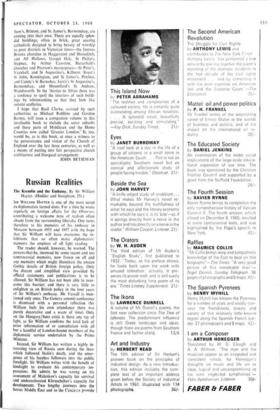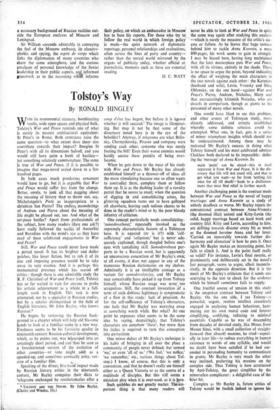Russian Realities
SIR WILLIAM HAYTER is one of the most noted ex-diplomatists turned dons. For a time he wrote regularly on foreign affairs for the Observer, contributing a welcome note of realism often absent from the surrounding liberalia. One turns therefore to his memoirs of his embassy in Moscow between 1953 and 1957 with the hope that Sir William will have overcome the in- hibitions that so often make diplomatists' memoirs the emptiest of all light reading.
The reader should, however, be warned. The powers-that-be, incensed by some recent and too controversial memoirs, now frown on all and any memoirs which might illuminate the unseen Gothic details of British foreign policy. Only the distant and simplified view provided by official statements and publications is to be allowed. Sir William has not been able to over- come this barrier; and there is very little to enlighten us on British policy in the four years of Sir William's embassy. Mr Vassal! is men- tioned only once. The Geneva summit conference is dismissed with a personal reflection (Sir William feels his own attendance there was purely decorative and a waste of time). Only on the Hungary/Suez crisis is there any ray of light, as Sir William confirms the total lack of prior information of or consultation with all but a handful of London-bound members of the diplomatic service undertaken by the Prime Minister.
Instead, Sir William has written a highly in- teresting view of Russia seen during the thaw which followed Stalin's death, and the emer- gence of his faceless followers into the public limelight. Sir William writes with the benefit of hindsight to evaluate his contemporary im- pressions. He admits he was wrong on his assessment of Malenkov's capacity for survival and underestimated Khruschchev's capacity for development. Two lengthy journeys into the Soviet Middle East and to the Caucasus provide
a necessary background of Russian realities' out- side the European enclaves of Moscow and Leningrad.
Sir William succeeds admirably in conveying the feel of the Moscow embassy, its claustro- phobia and spying, the esprit de corps which links the diplomatists of many countries who share the same atmosphere, and the curious amalgam of personal knowledge of the Soviet leadership in their public aspects, ani.informed guesswork as to the reasoning wih115 informs their policy, on which an ambassador in Moscow" has to base his reports. For those who try to follow the real world in which foreign policy is is made—the quiet network of diplomatic reportage, personal relationships and evaluations,' often across the lines of party and country—, rather than the unreal world mirrored by the organs of publicity today, whether official or journalistic, memoirs such as these are essential, reading.
D. C. WATT







































 Previous page
Previous page